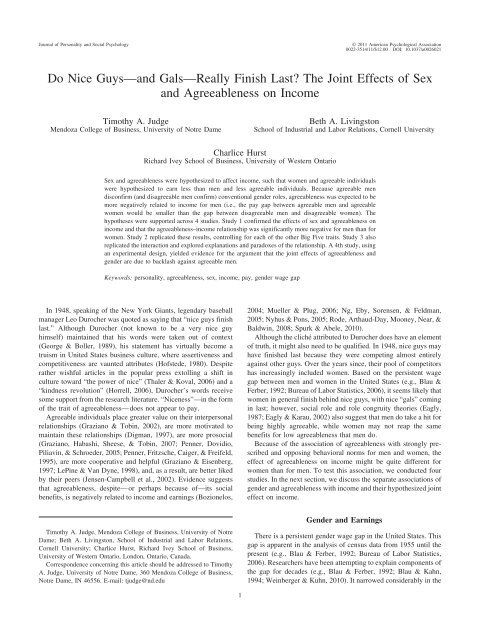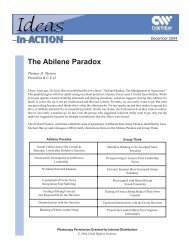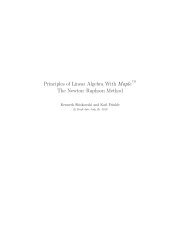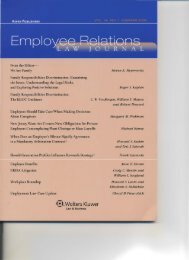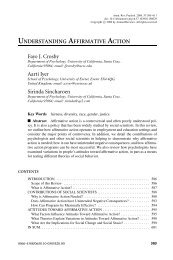Do Nice Guysâand GalsâReally Finish Last - Southeastern ...
Do Nice Guysâand GalsâReally Finish Last - Southeastern ...
Do Nice Guysâand GalsâReally Finish Last - Southeastern ...
You also want an ePaper? Increase the reach of your titles
YUMPU automatically turns print PDFs into web optimized ePapers that Google loves.
Journal of Personality and Social Psychology<br />
© 2011 American Psychological Association<br />
2011, Vol. ●●, No. ●, 000–000 0022-3514/11/$12.00 DOI: 10.1037/a0026021<br />
<strong>Do</strong> <strong>Nice</strong> Guys—and Gals—Really <strong>Finish</strong> <strong>Last</strong>? The Joint Effects of Sex<br />
and Agreeableness on Income<br />
Timothy A. Judge<br />
Mendoza College of Business, University of Notre Dame<br />
Beth A. Livingston<br />
School of Industrial and Labor Relations, Cornell University<br />
Charlice Hurst<br />
Richard Ivey School of Business, University of Western Ontario<br />
Sex and agreeableness were hypothesized to affect income, such that women and agreeable individuals<br />
were hypothesized to earn less than men and less agreeable individuals. Because agreeable men<br />
disconfirm (and disagreeable men confirm) conventional gender roles, agreeableness was expected to be<br />
more negatively related to income for men (i.e., the pay gap between agreeable men and agreeable<br />
women would be smaller than the gap between disagreeable men and disagreeable women). The<br />
hypotheses were supported across 4 studies. Study 1 confirmed the effects of sex and agreeableness on<br />
income and that the agreeableness–income relationship was significantly more negative for men than for<br />
women. Study 2 replicated these results, controlling for each of the other Big Five traits. Study 3 also<br />
replicated the interaction and explored explanations and paradoxes of the relationship. A 4th study, using<br />
an experimental design, yielded evidence for the argument that the joint effects of agreeableness and<br />
gender are due to backlash against agreeable men.<br />
Keywords: personality, agreeableness, sex, income, pay, gender wage gap<br />
In 1948, speaking of the New York Giants, legendary baseball<br />
manager Leo Durocher was quoted as saying that “nice guys finish<br />
last.” Although Durocher (not known to be a very nice guy<br />
himself) maintained that his words were taken out of context<br />
(George & Boller, 1989), his statement has virtually become a<br />
truism in United States business culture, where assertiveness and<br />
competitiveness are vaunted attributes (Hofstede, 1980). Despite<br />
rather wishful articles in the popular press extolling a shift in<br />
culture toward “the power of nice” (Thaler & Koval, 2006) and a<br />
“kindness revolution” (Horrell, 2006), Durocher’s words receive<br />
some support from the research literature. “<strong>Nice</strong>ness”—in the form<br />
of the trait of agreeableness—does not appear to pay.<br />
Agreeable individuals place greater value on their interpersonal<br />
relationships (Graziano & Tobin, 2002), are more motivated to<br />
maintain these relationships (Digman, 1997), are more prosocial<br />
(Graziano, Habashi, Sheese, & Tobin, 2007; Penner, <strong>Do</strong>vidio,<br />
Piliavin, & Schroeder, 2005; Penner, Fritzsche, Caiger, & Freifeld,<br />
1995), are more cooperative and helpful (Graziano & Eisenberg,<br />
1997; LePine & Van Dyne, 1998), and, as a result, are better liked<br />
by their peers (Jensen-Campbell et al., 2002). Evidence suggests<br />
that agreeableness, despite—or perhaps because of—its social<br />
benefits, is negatively related to income and earnings (Bozionelos,<br />
2004; Mueller & Plug, 2006; Ng, Eby, Sorensen, & Feldman,<br />
2005; Nyhus & Pons, 2005; Rode, Arthaud-Day, Mooney, Near, &<br />
Baldwin, 2008; Spurk & Abele, 2010).<br />
Although the cliché attributed to Durocher does have an element<br />
of truth, it might also need to be qualified. In 1948, nice guys may<br />
have finished last because they were competing almost entirely<br />
against other guys. Over the years since, their pool of competitors<br />
has increasingly included women. Based on the persistent wage<br />
gap between men and women in the United States (e.g., Blau &<br />
Ferber, 1992; Bureau of Labor Statistics, 2006), it seems likely that<br />
women in general finish behind nice guys, with nice “gals” coming<br />
in last; however, social role and role congruity theories (Eagly,<br />
1987; Eagly & Karau, 2002) also suggest that men do take a hit for<br />
being highly agreeable, while women may not reap the same<br />
benefits for low agreeableness that men do.<br />
Because of the association of agreeableness with strongly prescribed<br />
and opposing behavioral norms for men and women, the<br />
effect of agreeableness on income might be quite different for<br />
women than for men. To test this association, we conducted four<br />
studies. In the next section, we discuss the separate associations of<br />
gender and agreeableness with income and their hypothesized joint<br />
effect on income.<br />
Timothy A. Judge, Mendoza College of Business, University of Notre<br />
Dame; Beth A. Livingston, School of Industrial and Labor Relations,<br />
Cornell University; Charlice Hurst, Richard Ivey School of Business,<br />
University of Western Ontario, London, Ontario, Canada.<br />
Correspondence concerning this article should be addressed to Timothy<br />
A. Judge, University of Notre Dame, 360 Mendoza College of Business,<br />
Notre Dame, IN 46556. E-mail: tjudge@nd.edu<br />
Gender and Earnings<br />
There is a persistent gender wage gap in the United States. This<br />
gap is apparent in the analysis of census data from 1955 until the<br />
present (e.g., Blau & Ferber, 1992; Bureau of Labor Statistics,<br />
2006). Researchers have been attempting to explain components of<br />
the gap for decades (e.g., Blau & Ferber, 1992; Blau & Kahn,<br />
1994; Weinberger & Kuhn, 2010). It narrowed considerably in the<br />
1


